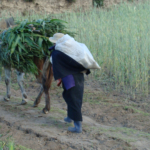


Programa de Promocion de la Sustentabilidad y Conocimientos Compartidos PROSUCO
FUNDAPA, JSP
Bolivia
8/2014—8/2017
Yapuchiris (expert farmers in Aymara) aim to satisfy most of smallholder farmers’ technology needs through shared processes of reflection and knowledge-sharing, combining local and scientific knowledge. The first phase of this project demonstrated that 40 Yapuchiris have been effective in their own communities to a limited and varying degree. Through offerings of technical assistance, they reach between 10-50% of the families in their villages. The Yapuchiris’ limited reach is attributed to the community members’ tendency to only recognize outsiders as experts, and the high levels of migration that have made more intensive participatory research or technical assistance models unsustainable. In response to this, the Yapuchiris began experimenting with other sharing mechanisms such as demonstration plots, giving advice at market fairs, providing fumigation services with agroecological inputs, selling bio-inputs, and working in local schools. These other routes have generated local governments’ demand for Yapuchiri services in other municipalities, as well as by development and research agencies. However, for the Yapuchiris to be contracted by these other entities, they need formal certification of their expertise. Thus the proposed second phase of the project will focus on formalizing, consolidating, and expanding the Yapuchiris’ competencies through the creation of a modular curriculum and open-air school.
A baseline survey on the learning, innovation and dissemination practices of all of the 98 expert farmers-extensionists (Yapuchiris) from 3 different farmer associations in the altiplano of Bolivia showed that Yapuchiris who are part of Funapa, as association of smaller scale farmers more oriented towards subsistence farming and agroecology, had the highest level of self-learning, innovation and research among the Yapuchiris, while JSP – the association more associated with market oriented and input intensive potato production – had the highest level of dissemination of innovations among the Yapuchiris and the newest association in Oruro had the lowest score in all 4 dimensions (innovation, research, self-learning and dissemination.) This suggests that market forces provide a strong motivation for receiving extension advice, while more integrated agroecology requires more intensive research, innovation and learning processes. It also confirms that these skills and activities increase over time due to the project intervention (capacity building of Yapuchiris).
The project developed a linkage between expert farmers and a rural school in the Altiplano of 569 students and 16 teachers under the auspice of the “Productive Sociocomunitary Project-PSP” in Bolivian law, which broadly promotes linking schools with a practical curriculum to improve life skills. 13 teachers visited the farm of a Yapuchiri, or lead farmer to learn about his adobe greenhouse and the bioinputs he makes, after which 6 teachers decided to work with PSP, the rest felt it wasn’t their area. 4 of the 6 members of the parent committee also decided to participate in the PSP. Many students thought they already new how to farm before participating and were not excited by it, but then really liked the activities of constructing a greenhouse and making bioinputs collectively at the school with the guidance of the yapuchiri and realized they were learning new things. Some students were motivated to share what they learned in different community, municipal, and student fairs. The parents had previously tried to get a greenhouse built in a PSP but without the help of actual farmers, this time the presence of the Yapuchiris increased their knowledge on the topic and they were able to get money from the municipality to build a greenhouse. The teachers felt that this experience, that included a dynamic planning workshop, helped them take advantage of PSP in a more deliberate and focused way then in the past.A study done of 98 yachuchiris or expert farmers belonging to 3 organizations in the Bolivian altiplano using a survey and interview, show that 10% had really achieved the 4 elements of being a yapuchiri: learning, research, innovation, spreading adapted knowledge. This 10% had reached 8308 farmers are were socially recognized in those communities. A 2nd type, which represents 21% do everything except research, they skip that and go straight to innovation a diffusion without much testing, they have worked with 3578 farmers. The largest group (65%) have done the first 3 steps but struggle with diffusion, because they are just starting and/or have pedagogical or social issues, they have worked with 2,143 farmers. Women yapuchiris have more limitations in diffusion because of lack of mobility and time, but there was no relationship between gender or age in terms of learning. The most popular topics are bioinputs and agroecological production of potato and quinoa.
